La presidencia de Jair Bolsonaro sucede en una etapa de avances de populistas de extrema derecha en América y Europa. Tiempo donde se populariza la enunciación de discursos antidemocráticos que promueven el odio al “otro”. Una exclusión popular de aquellos señalados como no-miembros de la comunidad. Por lo mismo, el triunfo de Bolsonaro no puede leerse como un momento extraordinario. Cuando el candidato brasileño lanza su campaña, ya habían pasado cuatro años desde que Victor Orbán —presidente de Hungría— había expresado la naturaleza “iliberal” de su régimen. Mientras que en el norte del continente, Donald J. Trump gozaba de una gran popularidad (41%1) durante su segundo año de gobierno. Sin embargo, no debemos pasar por alto que los triunfos populistas también se asientan en crisis económicas.
Una gran diferencia respecto al fascismo que se encumbró en Europa hace cien años consiste en la manera en que la extrema derecha alcanza el poder. Ahora ya no lo hace a través de la apología de la violencia como medio de ascenso legítimo al poder; sino a partir de la seducción de los ciudadanos que eligen democráticamente posiciones intolerantes que parten de la constitución de un enemigo público que amenaza a la nación. Esto ocurre durante lo que parece ser el final del neoliberalismo y su substitución por una nueva etapa del capitalismo —donde a pesar de la creciente y evidente amenaza para la vida que constituye la explotación sin límites del planeta– surgen líderes que apelan al futuro a partir de volver al pasado.
Bolsonaro es parte de una nueva corriente política. Ayudado por las redes sociales –que en sus primeros momentos parecían armas de la utopía por construir— fue capaz de cautivar a los electores. Así, en esta sociedad, la democracia se muestra como un navío que zarpa rumbo a una sociedad mejor; pero en su travesía encuentra un canto que le fascina y la arrastra. Sin cuerdas que la aten, celebra un festín lúgubre que la conduce hacia la exclusión del otro: el triunfo de la antidemocracia.
En este tránsito, las redes sociales juegan un papel central. Desde ahí se generan estrategias que apelan a la experiencia sensible de los ciudadanos más no buscan construir comunidades. Por el contrario, generan una mayor distancia entre los ciudadanos y los agrupan en bandos antagónicos que los confrontan. Entre más intenso el odio mayores las interacciones. La democracia es un sueño de la modernidad que buscan a través de la racionalidad lograr un equilibrio entre los deseos individuales y aquello que beneficia a la comunidad. El reto democrático consiste precisamente en lograr el triunfo de la comunidad sobre el egoísmo individual. Para Tonnies la constitución de una comunidad depende de su capacidad para constituir una vida en común duradera y auténtica. Un reto que las democracias modernas no han logrado alcanzar. Por el contrario, las redes sociales apelan a la emotividad y buscan absorber el tiempo de los individuos para mercantilizarlo en la venta de “clicks” y “vistas”. Alejadas de lo común y donde la comunidad se concibe como una abstracción numérica evanescente.
La primera campaña de Jair Bolsonaro
El contexto de las campañas presidenciales del 2018 está marcado en el aspecto político por las acusaciones de corrupción contra miembros destacados del Partido del Trabajo (PT). Las cuales obligaron a la presidente en turno Dilma Roussef —quien fue relevada en su cargo por su vicepresidente Michel Temer— y resultaron en la detención al popular ex-presidente Luiz Inácio Lula da Silva, también conocido como Lula, en la cárcel. En términos económicos en una profunda crisis económica de más de cinco años y en medio de la mayor recesión de las últimas décadas. Además de un incremento en la letalidad de la violencia alcanzando el pico de 60,000 muertes al año. Y si bien posteriormente se mostró el uso político de la justicia para atacar al PT, durante las campañas del 2018, la indignación de la sociedad brasileña ante la corrupción del sistema político y la esperanza de cambio, generó las condiciones para el ascenso de un político asociado a una visión autoritaria que ofrecía solucionar todos los problemas a partir de una vuelta a los valores tradiciones junto con la ley y el orden.
Brasil sobre todo, Dios sobre todos
Bolsonaro comienza su participación en la vida pública —todavía en activa en las fuerzas armadas— mediante un artículo publicado en la revista Veja donde critica las bajas remuneraciones que el ejército paga a sus miembros. Una crítica que le valió un encarcelamiento de catorce días. Posteriormente fue señalado como uno de los integrantes de una conjura para hacer explotar una guarnición militar y aunque no fue condenado; pronto pasó a ser parte del ejército de reserva. Dando inicio a su carrera política desde la que impulsó mejoras en las condiciones de vida para el ejército; ya sea mayor beneficios para los oficiales en retiro o mejores prestaciones para la tropa.
La carrera política de Bolsonaro comienza con posiciones políticas marginales. El primer partido donde milita en el partido Demócrata Cristiano. Sin embargo, su principal apoyo son sus contactos con el ejército y su preocupación por las condiciones de vida de los soldados. Una cercanía que también se funda en su posicionamiento ideológico. Ya que siempre reivindicó la dictadura como un momento de orden y progreso para Brasil. Incluso con declaraciones temerarias como promover el uso de la tortura y la abolición del Congreso para instaurar una junta militar. Posteriormente también añadió a su arsenal político la condena del matrimonio homosexual y la educación sexual.
El triunfo del PT de la mano de Lula logró impulsar políticas contra la marginación de los afrobrasileños; promovió la educación sexual y buscó respetar los derechos de las disidencias sexo-genéricas. Por lo mismo, Bolsonaro, a quien hasta entonces se le había considerado como un político anacrónico, se convirtió en el vocero de las élites brasileñas que buscaban enfrentar las transformaciones reivindicatorias promovidas por el gobernante Partido del Trabajo. Ya que se atrevió a verbalizar los prejuicios antidemocráticos de las élites conservadoras del interior del país. En el mismo sentido, podemos señalar su oposición a los apoyos a las comunidades afrobrasileñas; a las que tachó de vivir de los subsidios sin hacer nada. Asimismo, se opuso frontalmente a los planes de educación sexual a los que denominó el “gay kit”; lo que lo acercó a las poderosas iglesias evangélicas brasileñas. También su adoración del militarismo, en oposición al control de armas promovido por los gobiernos progresistas, y su apoyo irrestricto a la libertad empresarial resultó un canto de sirena para aquellos que añoraban el progreso económico que produjo la dictadura militar y para los pequeños y medianos ganaderos que vieron en su propuesta un gobierno tolerante a la transformación de la selva amazónica en área de pastoreo. De manera paradójica, el triunfo de las políticas progresivas del PT crearon una ola reaccionaria que encumbró a Bolsonaro: un candidato que lucha abiertamente por mantener las condiciones de opresión.
Un elemento central en el ascenso de Bolsonaro ha sido su capacidad para instrumentalizar las redes sociales para promover su discurso. Desde ahí ha logrado promover un discurso fundado en teorías de la conspiración. Donde existe una conspiración heterogénea desde la cual se busca destruir los valores de la nación brasileña. En la primera campaña de Jair Bolsonaro, durante el 2018, no solamente se utilizaron canales de difusión e interacción en el espacio sociodigital como son YouTube, Twitter y Facebook; además que también logró consolidar una red de más de 40 mil grupos de Whatsapp. En ellos, un ejército de Bolsominions —término con el que se conoció a sus más apasionados seguidores— difundieron su mensaje de forma “directa” a los electores.
Durante esta primera campaña sufrió un intento de asesinato que fue grabado y difundido en las redes sociales. De esta forma, Bolsonaro logró ocupar un nicho privilegiado durante la campaña; ya que el resto de los candidatos, preocupados por ser tachados de envilecidos, redujeron sus críticas al candidato convaleciente. El cual aprovechó, desde las redes socio digitales, este nuevo impulso mediático a su campaña. Ahora libre de la obligación de asistir a cualquier debate o escenario adverso; la campaña de Bolsonaro logró impulsar al candidato sin ninguna restricción.
La campaña antidemocrática de Jair Bolsonaro
Durante la campaña presidencial del 2018 en Brasil, las redes socio-digitales conformaron un espacio para la difusión del mensaje de Jair Bolsonaro que le facilitó trastocar el equilibrio político tradicional. Hasta entonces las cadenas televisoras jugaban un papel trascendental en la mediación entre el electorado y los candidatos presidenciales. Por lo mismo, el apoyo de estos grupos mediático empresariales jugaban un papel central en la definición del orden político. Sin embargo, el arribo de las redes socio digitales permitieron que políticos marginales pudieran contactar al electorado de “manera directa”. Lo que permitió promover mensajes antidemocráticos que difícilmente podían enunciarse en los medios tradicionales. Tal es el caso de Jair Bolsonaro quien a partir de un mensaje de odio y orden logró obtener la mayoría de los votos durante la elección presidencial del 2018.
Las campañas en las redes socio digitales no se restringen a una sola plataforma ni a un medio de comunicación. Por el contrario, existen ciclos de retroalimentación entre las redes y los diferentes medios para constituir el fenómeno de comunicación que puede llegar a incidir en la agenda de los medios de comunicación masiva. A nivel del ciudadano, no sólo se trata de plataformas socio digitales como son Twitter, Facebook y YouTube sino también los grupos de mensajería (Whatsapp y Telegram) donde pueden lanzarse imágenes que difícilmente podrían difundirse en los medios de comunicación masiva. Por lo mismo, si bien por razones analíticas se expondrán en este trabajo las diferentes plataformas, es necesario considerar que estas no operan de forma separada sino que se articulan para la constitución del mensaje político antidemocrático del candidato.
Durante esta primera campaña el candidato utilizó Twitter (figura 1) como una forma de difundir su mensaje de forma “directa”. Los cuales no sólo se difunden en esta red sino que eran retomados por los diferentes grupos de Whatsapp para difundirse entre la población. En esta sección realizaremos un análisis del discurso de los 4,324 mensajes publicados en la plataforma Twitter emitidos por la cuenta de Jair Bolsonaro en esta plataforma. Al interior de esta plataforma no solamente se difunden los mensajes desde la cuenta del entonces candidato sino también desde otras cuentas “aliadas” que ayudan a la difusión de estos mensajes.
Figura 1
Frecuencia de tipo de mensajes asociados a la cuenta en Twitter de Bolsonaro durante la campaña presidencial del 2018
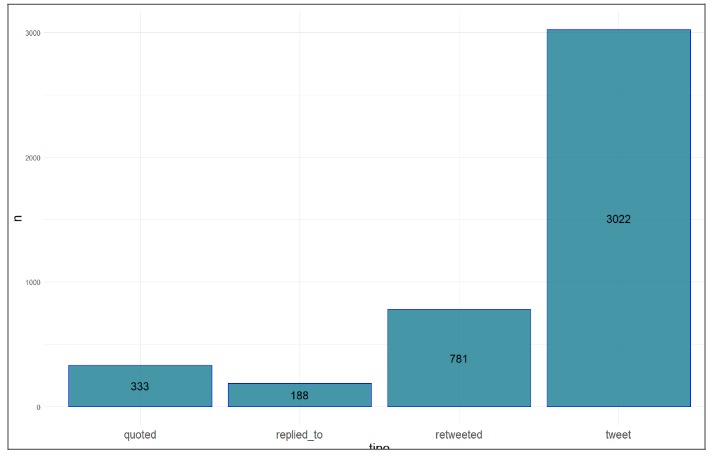
Los mensajes de un candidato no se limitan solamente a la audiencia directa de su cuenta en la plataforma Twitter; por el contrario, estos mensajes vuelven a difundirse a partir de cuentas “aliadas” que permiten la expansión de su comunicación. Dentro de esta primera campaña identificamos bajo los #SomosTodosBolsonaro, #Bolsonaro17 y #BolsonaroAmorDoBrasil a la participación de cuentas vinculadas a una ideología de derecha: Delegado Francischini (@Francischini_); Diga não à corrupção – Corrupción no (@corrupcaonews) y Patrick Dornele(@PatrickDornele).
Figura 2
Grafo de redes de difusión “Red Bolsonaro” durante la elección 2018
(nodos=15,796 y aristas= 25,016)
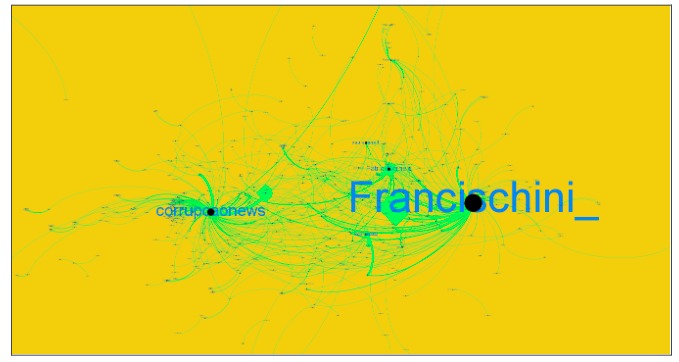
Figura 3
Principales cuentas difusión “Red Bolsonaro”

Un elemento central dentro de una visión antidemocrática consiste en pensar la confrontación electoral como una guerra. Donde el otro es un enemigo al cual se debe destruir. Un planteamiento opuesto al valor democrático de dirimir las diferencias al interior de un marco legal. En el caso de Bolsonaro la elección se plantea como una “guerra santa” donde se busca “salvar” el “alma” de la nación. Esta estrategia apela de forma clara a las emociones y promueve un enfrentamiento entre identidades políticas lo que reafirma la visión de guerra y donde ya no importan más los programas gubernamentales. De esta forma, los discursos inflamatorios del candidato conciben un Brasil orientado por valores tradicionales y la recuperación de la economía contra una nación que era destruída por los corruptos políticos del partido del trabajo. Esta perspectiva la encontramos desde el lema de campaña que lo acompañó: “¡Brasil acima tudo deus acima de todos!” (Brasil encima de todo y Dios encima de todos).
Figura 4
Colocaciones del discurso en Twitter de Jair Bolsonaro de los términos: Brasil y Deus
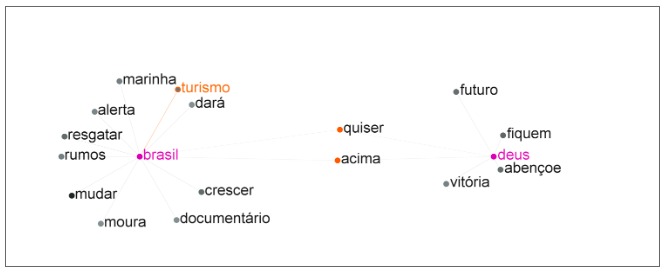
El análisis de la figura 4 nos permite observar la conexión entre el discurso político de Bolsonaro y el discurso religioso. Donde la figura de Dios (Deus) juega un papel central. Ya que tanto este elemento religioso como la milicia aparecen asociados a las transformaciones que se plantean para el futuro de Brasil. Por lo mismo el rescate consiste en apelar a la recuperación de valores tradicionales —donde de forma antidemocrática se busca reestringir los derechos de las disidencias sexo-genéricas— y el orden apelando a una mayor participación de las fuerzas armadas dentro de la vida pública.
Figura 5
Colocaciones del discurso en Twitter de Jair Bolsonaro de los términos: criancas y canalhas
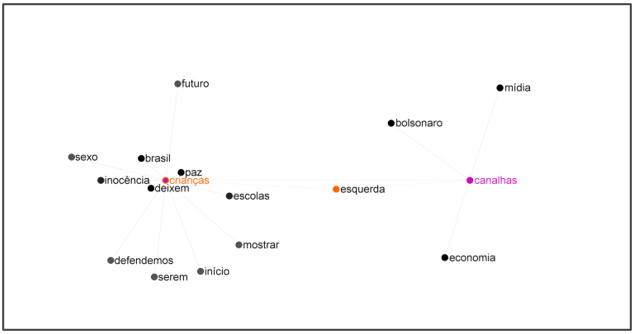
Mientras que en la Figura 5 podemos observar como se construye a la izquierda (esquerda) como una doble amenaza: un enemigo a destruir. Por una parte, se les señala por su corrupción a la cual consideran como una causa central para la destrucción de la economía del país, apoyados por un lobby global que busca instituir el comunismo en Brasil. Al mismo tiempo, se les considera como una amenaza para las juventudes porque buscan a partir de la educación sexual “convertir” a los jóvenes en homosexuales. Todos estos mensajes reproducen una perspectiva de guerra entre dos sociedades divididas que deben enfrentarse fomentando la polarización y evitando el diálogo democrático y la tolerancia a las otras voces.
Figura 6
Imágenes difundidas en Twitter durante la campaña del 2018
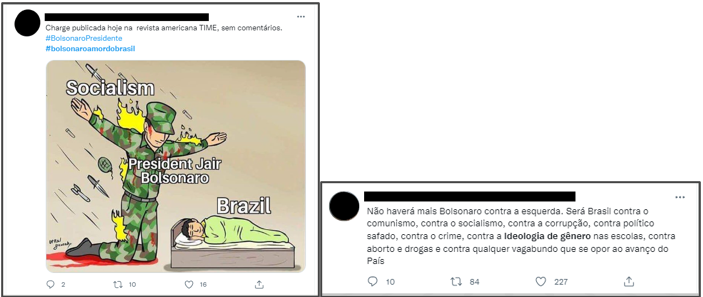
Los grupos cerrados en Facebook, Whatsapp y Telegram permiten la difusión de mensajes más agresivos. Ya que no permiten la respuesta de los adversarios políticos. Por ello, las fake news y la información que busca degradar al adversario se difunde más en este tipo de foros que en plataformas como Twitter donde es posible la réplica por parte de los adversarios. Sin embargo, el uso de este tipo de espacios degrada el diálogo democrático, ya que solamente repite las calumnias sin contrastar los hechos y contribuye de forma significativa a la polarización del electorado.
Figura 7
Imágenes difundidas en Facebook durante la campaña del 2018

Bolsonaro Presidente
El triunfo de Bolsonaro en las urnas estuvo acompañado de la exaltación de sus seguidores que proclamaban: ¡Vamos a cambiar Brasil! Así como por un mensaje televisivo del candidato triunfador, desde Río de Janeiro, donde después de encomendarse a Dios prometía acabar con la corrupción. Una celebración que contrastaba con el diagnóstico de los analistas que veían un riesgo para la democracia con el ascenso de un populista de extrema derecha a la presidencia de Brasil.
La primera acción como Presidente fue transferir el control de las reservas para los pueblos originarios al Ministerio de Agricultura. Una institución controlada por los intereses de los agro-negocios. Un evento que marcó la política a favor de la empresa privada en detrimento de las reservas amazónicas. Esta situación se remarcó con la aprobación del uso de pesticidas hasta entonces prohibidos en la industria agrícola. Además de la pasividad ante los incendios provocados en la selva amazónica que abren nuevos espacios para la ganadería. En el mismo sentido, tan sólo unos meses después del inicio de su mandato, la deforestación del Amazonas llegó a su nivel más alto. Situación que provocó alarma a nivel internacional más no para el gobierno brasileño.
Desde un inicio, el gobierno del ex-militar estuvo marcado por las tensiones sociales. Donde los grupos evangélicos pro-Bolsonaro buscaban llevar su mensaje de evangelización y la recuperación de los valores tradicionales al Carnaval de Río. Mientras grupos antagónicos a Bolsonaro buscaban visibilizar la situación de riesgo para las mujeres, las disidencias sexuales y los activistas a partir de su participación con mensajes políticos en el mismo Carnaval. Incluso el propio Presidente participó en esta disputa al condenar a la tradicional festividad como un acto donde se promueven valores contrarios a la familia tradicional. Sin embargo, toda está creciente tensión se pondría en pausa con el arribo del Covid-19.
Durante la mayor parte de la pandemia, al igual que otros líderes populistas de derecha, Bolsonaro desestimó la gravedad de la situación. En este caso, todo comenzó con un amargo desencuentro con su propio ministro de Salud. Ya que mientras el Presidente buscaba mantener abierta la economía; el ministro Luiz Henrique Mandetta señalaba la importancia de dar prioridad a la vida sobre la actividad económica. Declaraciones por las que el Ministro fue depuesto. Dada la falta de medidas sanitarias, Brasil fue uno de los países con mayor mortandad de la región durante la pandemia. Lo que provocó un fuerte rechazo al presidente entre la población. Por lo mismo, se organizaron movilizaciones en las calles pidiendo su destitución.
De esta manera, en la última parte de su mandato y mientras busca su reelección, Bolsonaro enfrenta escándalos de corrupción que se han venido acumulando desde los primeros meses de su gobierno; los escándalos por su actuación durante la pandemia y por si esto fuera poco, el resurgimiento de Lula, quien después de salir de la cárcel, vuelve a ser el favorito para ocupar la presidencia de Brasil. Por lo mismo, el cierre del gobierno del ex-militar muestra una faceta opuesta a los momentos de esperanza que marcó su elección para sus seguidores.
El discurso presidencial antidemocrático en las redes socio digitales
Durante su etapa presidencial, Bolsonaro utilizó las redes socio digitales como un instrumento para la difusión de su política de gobierno y al mismo tiempo, para mantener un contacto “directo” con sus simpatizantes. De esta forma, las redes sociales dejaron de ser un instrumento de campaña para convertirse en un instrumento de gobierno. Sin embargo, el discurso de Bolsonaro —sobretodo durante su etapa presidencial— no se limita al del propio Jair Bolsonaro. Ya que muchas veces la ideología se plasma en sus aliados más que en el discurso oficial.
El triunfo de Jair Bolsonaro también implicó cambios en su discurso. Durante la campaña –como se señaló previamente— tuvo como enfoque central la “guerra” por la nación. Lo que también implicó la idea de una reconciliación nacional a partir de la purificación del cuerpo nacional. Mientras que como presidente la cuenta se volvió el principal instrumento para difundir sus acciones de gobierno manteniendo una cercanía con la ciudadanía. En la Figura 8 podemos observar como en la etapa de candidato aparece el término amor pero también aparecen los términos lula, dilma y corrupto. Mientras que el primero nos refiere a su propuesta de conciliación; los otros tres son los señalamientos a sus enemigos políticos corruptos.
Figura 8
Comparativo principales diez términos
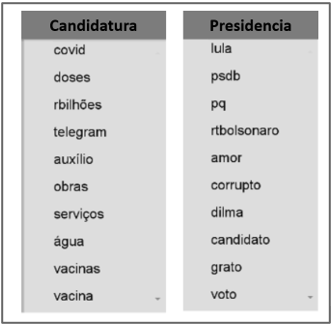
Mientras que la figura Figura 9 nos permite observar la red de actores que difundieron el Bolsonarismo en redes. Precisamente estos actores toman posiciones más ofensivas que el mismo candidato y promueven temas “difíciles” para el presidente; pero significativos para la base de simpatizantes. Dentro de ellos destacan Bibo Nunes (@bibonunes1) con 292 mil seguidores, Te Atualizei(@taoquei1) con 1.3 millones de seguidores y Bia Kicis (@Biakicis) con 1.4 millones de seguidores.
Figura 9
Red de principales difusores en Twitter del mensaje de Jair Bolsonaro durante su etapa presidencial
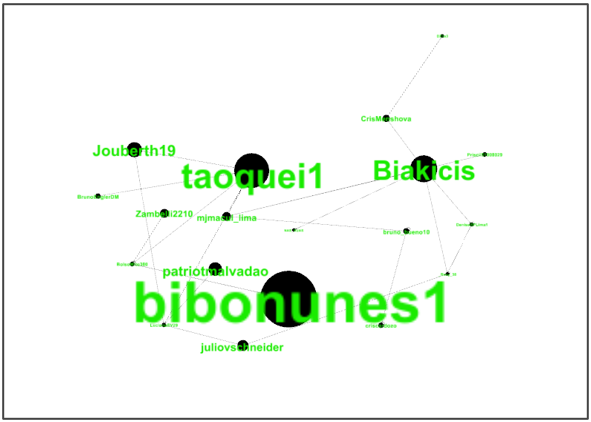
Comenzaremos con Alcibio Mesquita Bibo Nunes (conocido como Bibo Nunes) es un político-empresario que comenzó su carrera como periodista. Posteriormente, inicia su carrera política para convertirse en uno de los principales aliados de Bolsonaro, como promotor de sistemas de vigilancia masiva, de la amnistía a taladores ilegales de la selva amazónica, ataques a la oposición por su supuesto comunismo, contra los derechos de las disidencias sexo-genéricas y promotor de la reactivación económica durante la pandemia del COVID-19 (Figura 10). Mientras que un comparativo de términos utilizados entre Jair Bolsonaro, durante su presidencia, y Bibo Nunes (Figura 11) nos muestra que mientras el primero mantiene un discurso que destaca sus acciones; el segundo mantiene su agresividad hacia los opositores al régimen. Esto lo podemos observar en que se mantiene con una alta frecuencia el término Lula y urubus. El primero se refiere al expresidente y decidido opositor a Bolsonaro y el segundo a la frase con la cual denosta a la oposición: “lloren buitres” (chorem urubus de plantao).
Figura 10
Tuits emitidos desde la cuenta @bibonunes1

Figura 11
Comparativo términos más frecuentes

Mientras que la cuenta Te Atualizei se dedica a la promoción de una ideología de derecha principalmente enfocada en la denostación de los derechos de las disidencias sexo-genéricos. Esta cuenta, asociada a un canal de YouTube con 1.7 millones de suscriptores y un servicio de paga (teatualizei.app), tiene como protagonista principal a la youtuber y bloguera Barbara Destéfani. Ella es conocida por ser una ferviente simpatizante de Jair Bolsonaro ha utilizado el canal para la promoción de una política antivacunas y de fake news sobre los opositores al gobierno de derecha. Lo cual le ha valido una investigación del Tribunal Superior Electoral Brasileño. En el comparativo de términos entre la cuenta de Jair Bolsonaro, como presidente, y la cuenta de Teatualizei encontramos que la primera mantiene su énfasis en acciones gubernamentales. Mientras que la segunda es una cuenta cuyas principales palabras están enfocadas en mensajes que enmarcan lo que la cuenta retuitea como “mira” (olha), “vamos” (bora) “vou” (voy). Al mismo tiempo mantiene un tono en común en el uso de expresiones emotivas, las cuales se enfatizan con la repetición de letras, en los mensajes como: aaahlindo, aaaahhh ó aaaiiin (Figura 12).
Figura 12
Tuits emitidos desde la cuenta @taoquei1

Figura 13
Comparativo de términos

Beatriz Kicis Torrents de Sordi, política brasileña conocida como Bia Kicis, que busca una reforma en el sistema educativo brasileño que promueva una ideología de derecha, normalización de la posesión de armas y fundamentalismo religioso (figura 13). Donde promueve el rechaza a cualquier medida de planificación familiar y el encumbramiento de la familia tradicional. Durante su campaña política ha difundido fake news respeto a la asociación entre Lula y las Fuerzas Armadas Revolucionarias de Colombia (FARC); así como sobre la peligrosidad de la pandemia del COVID-19. En el caso del comparativo de términos entre la cuenta de Jair Bolsonaro presidente y Kia Bicis (figura 14) identificamos que al igual que con las otras cuentas, Bolsonaro asume un papel institucional enfocado en la difusión de sus acciones gubernamentales. Mientras que la cuenta de Bia Kicis tiene un papel más agresivo donde mantiene la importancia del término Lula, expresidente opositor a Bolsonaro, en sus discursos; también aparece el término fake news que se utiliza para denostar noticias que demeritan a la derecha y por último, el término retrospectiva que señala un resumen noticioso altamente tendencioso que difunde la propia Bia Kicis desde su cuenta. También comparten el uso de términos donde la derecha se victimiza a pesar de estar ocupando el poder político como abajo la tiranía (abaixotirania) a pesar de ser gobierno y abajo la censura (abaixocensura).
Figura 14
Tuits emitidos desde la cuenta @BiaKicis

Figura 15
Comparativo de términos

En el discurso de Jair Bolsonaro encontramos dos momentos. El primero es como candidato donde su cuenta juega un papel fundamental para la difusión de un discurso de derecha antidemocrática. Ahí denosta acusa a los miembros del PT de ser una élite corrupta que busca corromper a la familia a partir de la promoción de la homosexualidad. También asume claramente una posición desarrollista que pone en riesgo a la selva Amazónica. Sin embargo, una vez que asume la presidencia, su cuenta se vuelve más institucional y su discurso se enfoca en la promoción de los logros de su gobierno. Por lo tanto, el discurso más Bolsonarista se difunde desde cuentas “aliadas” que siguen promoviendo abiertamiente el odio hacia el PT, acusandolos de promover el genocidio de niños y niñas no nacidos, una educación que promueve la homosexualidad y va en contra de los valores de las familias brasileñas.
De esta forma, podemos señalar que Jair Bolsonaro durante su etapa como candidato a presidente enarboló valores antidemocráticos que se plasmaron en un discurso que planteó a la elección como una guerra contra los corruptores de la nación. Un discurso que facilita su alianza con las iglesias evangélicas al enarbolar a la familia tradicional como el modelo oficial y una gran cercanía con las élites empresariales al permitir la explotación de nuevos espacios para la ganadería. Por último, se mantiene la construcción constante del PT, y particularmente Lula, como el enemigo corrupto a destruir.
Por lo mismo, la democracia sufre claros ataques en dos frentes. Primero, al confrontar a los rivales políticos como enemigos y no como adversarios. Lo que promueve la polarización de la sociedad y la intolerancia a los otros. Lo que genera una ambiente donde puede surgir fácilmente la violencia en cualquier nivel de la sociedad. Segundo, busca imponer a las disidencias sexo-genéricas una visión de la familia. Por lo mismo, no se logra sostener el valor democrático de respeto a la opinión de los otros. Ya que se busca obligar a las disidencias sexo-genéricas a partir del no reconocimiento de su forma de vida a someterse a los valores de la familia tradicional.
El ascenso de discursos de la extrema derecha antidemocrática en Brasil forma parte de una ola renovada en América y Europa. Donde la democracia no ha logrado sostener su promesa de un desarrollo para todos. Por lo mismo, los discursos contra ella tienen resonancia en una población cansada de no obtener los beneficios que acumulan unos cuantos. Sin embargo, de forma paradójica la población elige una opción de gobierno que históricamente beneficia sólo a unos cuantos. Las redes socio digitales que permiten un contacto “sin mediaciones” entre la población y los mensajes de los candidatos juegan un papel fundamental; ya que vuelven un espacio donde se puede decir todo sin ninguna medida. Por lo mismo, los discursos que hasta ahora se consideraban indecibles pueden ser dichos sin ninguna restricción. Dichos que apelan a la frustración de la población para lograr sus triunfos electorales sin proponer alguna alternativa real de gobierno.
[1] Gallup (https://news.gallup.com/poll/203198/presidential-approval-ratings-donald-trump.aspx) realizó encuestas a lo largo del mandato de Donald Trump. En promedio tuvo una aprobación del 41% y alcanzó sus máximos (49%)durante el 2019; mientras que sus mínimos (31%) fueron a principios del 2021.

Eduardo Paz es Doctor en Ciencias Sociales y Políticas por la Universidad Iberoamericana. Actualmente es docente invitado en la UAM-AZC. Tiene estudios de posgrado por UNAM y la Universidad Complutense de Madrid.
Te puede interesar: La Sirenita




